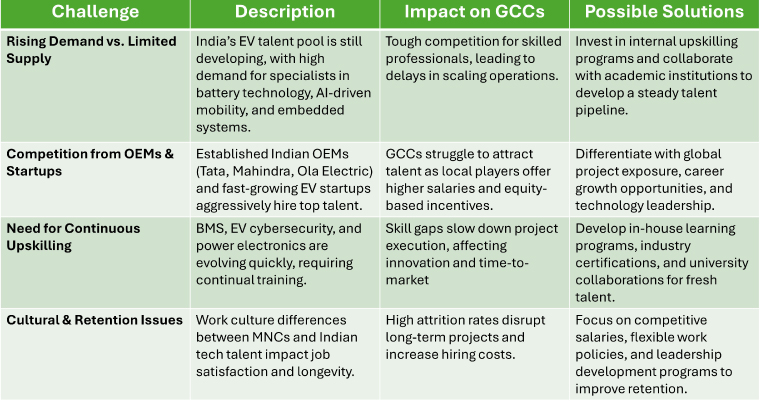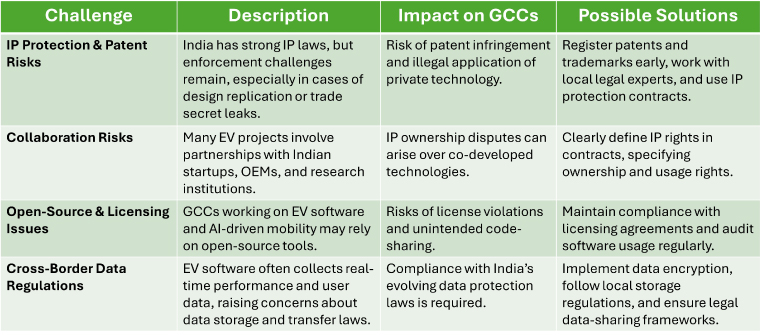-
What We Do
What we do
- Verticals
- Solutions
- Who We Are
Electric vehicle (EV) sales in India are rising rapidly, with forecasts of $150 billion by 2030. Electric mobility is accelerating because of government incentives, rapid technological developments, and changing customer tastes. India is also a viable place for global automotive companies looking to extend their EV footprint, both for sales and for GCCs looking to establish R&D hubs, engineering teams, and operational units.
India's EV growth opens new doors but also presents hurdles for GCCs. Setting up an EV-focused GCC in India involves strategic planning to navigate regulatory difficulties, talent constraints, and IP issues. The question is: Will India's EV surge benefit or challenge GCCs?
This blog explores EV-focused GCCs' advantages and challenges in India, market drivers, and how to develop a sustainable and competitive presence in this fast-evolving ecosystem.
The Indian EV market is quickly expanding, driven by government incentives, local industrial growth, and rising customer demand. The FAME II plan and tax cuts have increased affordability, while businesses are investing in domestic battery manufacture and charging infrastructure, with over 8,700 public charging stations already operating.
India provides GCCs with a strong skill pool, economic benefits, and a burgeoning EV ecosystem. However, strategic planning necessitates legislative complications, supply chain constraints, and skill shortages. While the market is promising, GCCs must overcome these challenges to build a long-term presence.
With cost benefits, a trained staff, and government support, India's fast-growing EV market offers GCCs excellent prospects. To fully maximize their profitability, businesses have to conquer essential obstacles.
Despite India’s promising EV market, GCCs face operational and regulatory hurdles that require careful navigation.
1. Regulatory Challenges
2. Charging & Battery Standardization Issues
3. Supply Chain & Localization Constraints
4. Bureaucratic Hurdles
As India's EV industry grows, GCCs compete for competent talent in battery technology, power electronics, AI-driven mobility, and embedded systems. Top talent is hard to find and keep in a fast-changing market.

As GCCs expand their EV operations in India, protecting intellectual property (IP) and managing partnerships becomes a critical challenge. With India’s growing EV R&D ecosystem, GCCs must navigate IP risks while fostering local collaborations.

Expanding into India’s fast-growing EV market presents a mix of opportunities and challenges for GCCs. To build a successful and sustainable presence, organizations must adopt a strategic approach that addresses regulatory hurdles, talent acquisition, and market-specific demands.
1. Establish a Strong Regulatory Compliance Framework
India’s state-wise EV policies and evolving regulations require GCCs to stay updated on tax incentives, import/export rules, and battery safety standards. Engaging with local legal teams and industry bodies can help ensure smooth compliance and avoid regulatory roadblocks.
2. Invest in Local Talent & Upskilling
Finding battery engineers, EV experts, and AI-driven mobility professionals still presents difficulty. To create a qualified workforce, GCCs should give training programs, university partnerships, and staff development projects the top priority. Top performers can be kept with competitive pay, chances for career development, and flexible work schedules.
3. Strengthen Supply Chain & Localization Strategies
With India pushing for self-reliant EV manufacturing, GCCs must prioritize local sourcing of components while building strong supplier relationships. Creating regional production hubs and leveraging government incentives for localized manufacturing will enhance operational efficiency.
4. Build Clear IP Protection Mechanisms
To mitigate intellectual property risks, GCCs must define clear ownership terms in contracts with local partners. Patent filings, trade secret protections, and secure R&D collaborations will be essential in safeguarding innovation.
5. Leverage India’s EV Innovation Ecosystem
India’s EV sector thrives on collaboration between startups, government R&D initiatives, and global players. GCCs should engage with local tech incubators, battery tech startups, and research institutions to stay ahead in innovation.
The growing EV market in India presents Global Capability Centers (GCCs) with a special chance to enter the field of electric mobility. The government incentives of the nation, skilled workforce, and growing EV ecosystem draw R&D, engineering, and supply chain innovation.
However, starting up and developing an EV-focused GCC in India requires negotiating complex rules, recruiting top people, protecting IP, and responding to changing supply chain demands. Strategic compliance planning, staff development, local collaborations, and IP protection are needed to succeed in this environment.
GCCs can overcome operational challenges and contribute to India's electrification by aligning with India's EV policy, upskilling, and using the innovation ecosystem. The future of EVs in India is bright, and GCCs that invest and innovate will benefit. Can your GCC handle India's EV market? Now is the time to proceed by connecting with the Gadgeon expert team.